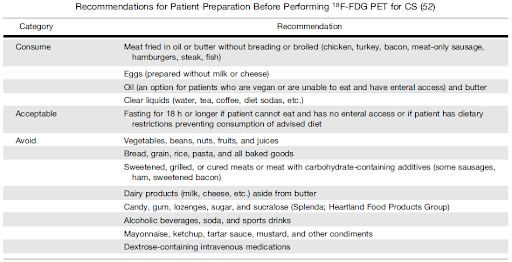PREPARING FOR F-18 FDG PET/CT STUDY
DO:
- Wear comfortable, loose fitting clothes, preferably without metal/zips. You may be asked to change into a gown for the investigation.
- Keep yourself warm, this improves our image quality.
- Drink lots of plain, unflavoured water (before and after the study).
- Continue using your normal medication as prescribed by your doctor (if it can be tolerated on an empty stomach) EXCEPT insulin. If you are a diabetic please refer to the section lower down on “What if I am a Diabetic” or contact the PET/CT Practice.
- It is always a good idea to bring a list of the medication you are taking when going to a doctor’s appointment/investigation.
- Inform us on arrival if you know you suffer from claustrophobia.
- Bring medication along that you may need for the investigation e.g. pain-relief/anti-anxiety medication. If you think you may need a sedative/anti-anxiety medication for the investigation, please make sure you have someone that can drive you home after the investigation.
- Inform the radiographer if you are pregnant (or think you may be), breastfeeding or have any allergies.
DO NOT:
- Do strenuous exercise 24 hours before the study.
- Eat or consume calories or anything with sugar 6 hours before the study (this includes sugar free gum, breath mints etc.). *
- Diabetic patients should not use their rapid acting insulin for 4 hours before and short-acting insulin 6 hours before the investigation – please refer to the section lower down on “What if I am a Diabetic”.
* Why do I need to fast on the day of the PET scan?
If you have eaten in the last 6 hours, then there is competition with the radioactive sugar for binding sites on cells and this results in a suboptimal scan quality. Furthermore, for diabetic patients we need their sugar to be less or equal to 9 mmol/l prior to injection even if they have not recently eaten, for the same reason. We perform a blood glucose test on every patient to make sure you are not diabetic and that your levels are within normal limits.
It is a good idea to follow a high protein, low carb diet 3 days before the PET scan (although this is not essential), as it will prepare your body for optimal uptake of the radiopharmaceutical. You may also find that you will not be as hungry on the morning of the scan.
Drink plenty of water on the morning of the scan to ensure that you are well hydrated. It will also make it easier to find your veins.
If you had breakfast by accident, the scan results cannot be trusted and the nuclear medicine physician will most probably request a re-scheduling of the appointment. This will have great cost implications on our and your behalf, but please do not withhold such information from us.
What if I am a Diabetic?
Special instructions for diabetic patients:
It is very important that your blood sugar is well controlled before the study. Following a balanced diet for a few days before the study will assist in ensuring that your blood sugar level is within normal (or near-normal) levels on the day of the study.
If your blood sugar is higher than 10 mmol/l on the day of the study, the study will have to be cancelled.
Type I Diabetes/Insulin-dependent diabetics:
- Your study will usually be booked during late morning.
- Please have a small breakfast no later than 06h00 and then take your insulin. Your injection will be scheduled 6 hours after the insulin injection. You should not use rapid acting insulin for 4 hours before and short-acting insulin for 6 hours before the study time.
- After this you may only have plain, unflavoured water.
Type II Diabetes/patients on oral diabetic medication only:
- Your study will usually be booked during late morning.
- You may have a small breakfast and take your diabetic medication at 05h00. Your study will be scheduled 6 hours after your meal.
- After this you may only have plain, unflavoured water.
Preparing for cardiac inflammation assessment:
- Purpose: Metabolic preparation prior to the PET scan performed to identify inflammatory pathology of the heart, including cardiac sarcoidosis and cardiac infections, is very important. The aim of this diet is to suppress normal glucose usage by the heart muscle and force it to rather use energy from fat.
- Details: A high fat, high protein, very low carbohydrate diet should be followed for ideally 3 days prior to the study followed by a prolonged period of not eating before the scan, for at least 12 hours.

*Chareonthaitawee P, Beanlands RS, Chen W, et al. Joint SNMMI-ASNC Expert Consensus Document on the Role of 18F-FDG PET/CT in Cardiac Sarcoid Detection and Therapy Monitoring. J Nucl Med. 2017 Aug;58(8):1341-1353.


